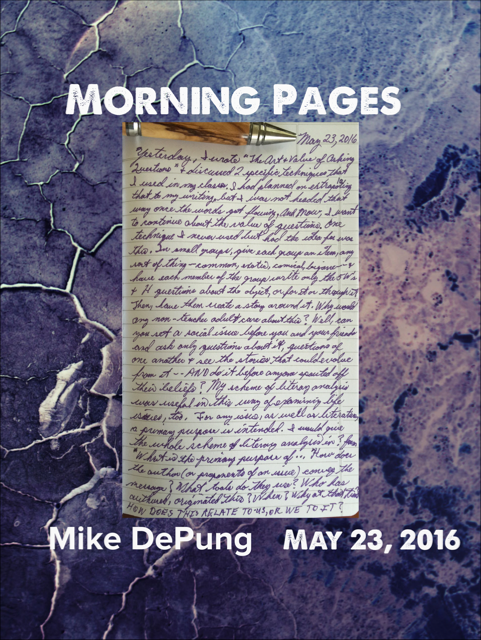 The power of questions, I think is greatly underestimated. If that wasn’t the case, then we would have fewer misunderstandings in many areas of life. When I taught, I tried to help students think in questions, big questions, little questions, specific techniques of questioning. Questions aren’t everything in education, but without questions to approach life, a life of learning, discovery, and understanding, education is pretty meaningless — true education, at least. I always sought to show how the skills and concepts that we developed in class — everything from note-taking to creative projects — could be useful for far beyond the classroom and for a long time after leaving formal education. One technique that I envisioned I never used in high school because of the crunch of curriculum time restraints; it would have been artificial and truncated. However, I know it would be great with younger students and could be adapted for use by older students. I would like to have had small groups of three to six students and give each group some object — common, exotic, comical — and assign each member of the group one or two of the 5 W’s + H questions (who, what, where, when, why, how). I would have them ask only questions and then share the questions by passing them to one another and answering them. Then, I would have them develop a story or situation or event around the object — anything. If you are reading this, right about now you may be thinking so what. This is what: the project is all about seeing things from others’ perspectives. What sorts of questions do they have about things? What answers to those questions are available? How can the development of a story occur? Think more advanced things like a scenario from history before wars — cultural, social, political, or otherwise — begin. What sorts of questions might have been in the minds of the stakeholders? What answers might they have considered? And could a group of adults do this and formulate questions and possible ways others might be thinking before spouting off some nationalistic bullshit? This would have worked wonderfully with students — adults, probably not so much because ego and society have trained too many exactly what to think. The technique that I did use all the time consisted of my scheme of literary analysis. My kids probably got sick of it. I presented it to them as an outline in all question form. I. What is the primary purpose of this piece of literature? (Can you answer this before you read analyze the literature?) II. What tools are used to discover this purpose? A. Who wrote this piece, and what characterized this person? When did she/he live? What was going on in the world at the time? B. What tools of thinking, writing, and literary devices and elements did the author use? How do those work in communicating the message? Why are they effective — or not? C. How do we (personally or as a culture, subculture) relate to this, and how does it relate to us? That was it. Asking these questions and searching for their answers will yield a relatively thoughtful conclusion about some specific aspect of the literature. But what if you substitute some specific issue or aspect of government, society, or economy? What is the primary purpose of immigration policy? Who have been main players in it? When and how was policy formed? What tools and resources inform decisions about policy? How does it affect us, and how do we feel about it? Get it??!! Questions engage portions of the brain that operate on a higher level than simple memory. When they are asked in a brainstorm type setting, as I mentioned yesterday, they also may help bypass ego — not as much time to rationalize. We always choose our life filter, but we have to make the conscious choice to operate according to our hearts. Hearts love questions, and mine often challenges me with really difficult ones. Ego is the default setting, and when folks don’t ask questions or won’t consider anyone else’s questions, then that is the ego working overtime. I choose my heart, and I delight in questions and the learning, exploration, discovery, and growth that they produce. That’s what I wanted for my students; that’s what I want for my readers.
0 Comments
Leave a Reply. |
Questions to consider:How many times have you asked yourself or simply thought about the following questions?
Who am I, really? What is my truth? How do my actions reveal what I really feel and believe? What would I do with my life if I could do anything? What is my passion? Why am I here? How can I discover answers to any of these questions? If you have considered any of these questions, I hope that my experiences and writing will give you some guidance. Please read my blog and comment and share your thoughts. I would love to hear from you! Archives
December 2019
Categories |

